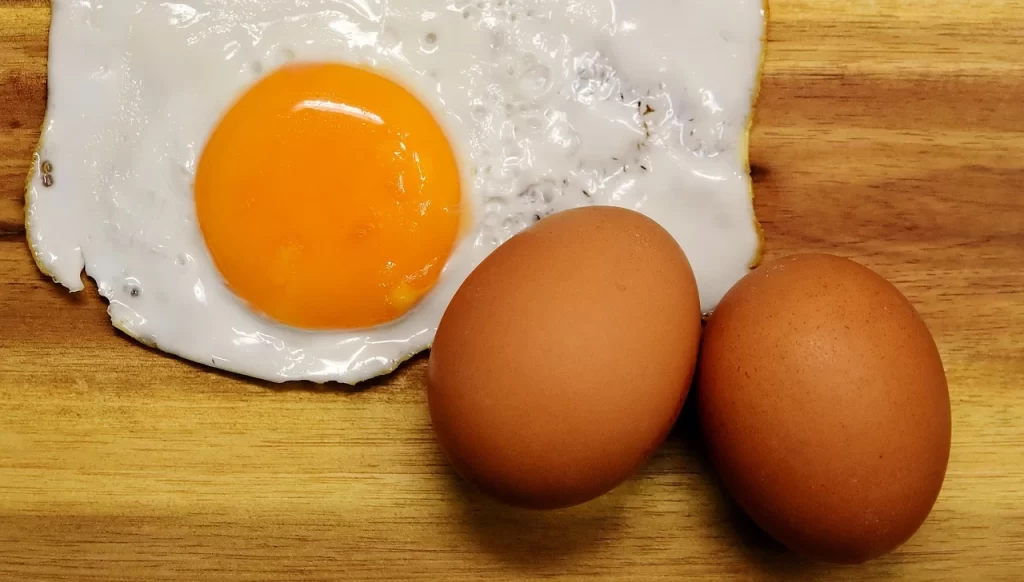Millions worldwide enjoy eggs, which are versatile in cooking and impressively nutritious. We will analyze the calorie content of eggs, focusing primarily on fried eggs, and reveal the essential nutrition facts that make this basic food a veritable source of health benefits in this article. Suppose you’re a fitness enthusiast wanting to increase your Protein is a common serving in many diets and plays a crucial role in overall health. consumption or simply interested in the calorie count of boiled eggs versus scrambled eggs. In that case, this article will deliver essential insights to direct your food choices.
Why Read This Article?
People who aim for a balanced diet must know the nutritional characteristics of eggs. As dietary trends continue to rise, it’s essential to tell apart myths from facts about eggs. This article will explain what defines a healthy quantity of eggs, their caloric makeup, and how to correctly add them to your meals, helping you make educated choices about your health and nutrition.
What Makes Eggs a Nutritional Powerhouse
For a good reason: eggs are consistently recognized for their nutritional superiority. The list of crucial vitamins and minerals necessary for regular bodily activities is extensive. Essential amino acids for healing and muscle building come from eggs in high amounts.
In addition, the unique nutritional makeup of eggs varies with the preparation approach and size of the egg. On the other hand, a significant egg can furnish roughly 6 grams of protein and 70 calories. The nutritional value extends to the egg itself and includes helpful substances like antioxidants that can help reduce inflammation and promote eye health.

How many Calories Do Fried Eggs Hold
Understanding egg calories requires recognition that different cooking methods may markedly affect the calorie content of fried eggs compared to other egg preparations. A single big fried egg usually consists of about 90 calories. Many rising calories result from incorporating cooking fats, especially butter or oil, during frying.
Understanding these changes can be helpful in your journey towards better choices if you’re careful about how many calories you consume and whether they fit your exercise routine. Frying can take anywhere from 30 to 70 calories, depending on the type and the quantity of fat used. Therefore, even though a fried egg can taste fantastic, it is often a more significant calorie option than a boiled or poached egg, which contains about 70 calories without additional fat.
Comparing the Calories in Two Eggs: What You Need to Know
When determining your calorie intake, asking how many calories in 2 eggs might factor into your daily nutrition is possible. Two cooked eggs give about 140 calories, but two pan-fried eggs can give somewhere between 200 and 220 calories due to the higher quality oil or butter used.
This variation is critical for those who track what they eat, especially those on the path to weight loss or tailored fitness goals. Healthy eating requires a balanced method of dividing food portions and cooking, regardless of the fact that eggs can deliver key protein and essential nutrients.
Nutrition Facts of Eggs
The nutritional data for eggs illustrates their complete advantages. A single large egg contains approximately: 6 grams of protein, which is a common serving in many diets.
- Protein: 6 grams
- Fat: 5 grams (along with 1.5 grams of saturated fat)
- Carbohydrates: Under 1 gram
- Vitamins: We must evaluate the standard of vitamins in your diet—an essential supplier of vitamin B12 and riboflavin.
- Minerals: Contains iron and selenium
For multiple bodily purposes, these nutrients are essential, making eggs a fantastic addition to your food. Egg fat is typically unsaturated, a situation that is good for heart health.
In what ways does the cooking method change the nutritional value
How we cook eggs can profoundly change their nutritional status. For instance:
- Boiled Eggs Keep most of their nutrients without extra fat, reducing the calories.
- Fried Eggs: While tasty, frying can increase calories and fat amounts based on the type of oil or butter used.
- Scrambled Eggs: They usually have milk or cream in them, raising the calorie count.
Anyone seeking to take advantage of the health benefits of eggs and keep a handle on their calorie consumption must be aware of these differences. Selecting the optimal cooking method can improve the nutritional makeup of what you eat, which is valuable advice for anyone looking to enhance their diet.
Learn More: 5 Ways to Make Money on TikTok in 2024
What are the advantages of Eating eggs for health
Many diets include eggs because of their diverse health benefits. They are known to:
- Support eye health: Lutein and zeaxanthin in eggs can lower the chances of eye health problems such as macular degeneration and cataracts.
- Aid in muscle development: Spartans will appreciate eggs rich in protein for muscle growth and recovery purposes.
- Contribute to brain health: Choline is vital for both the development and operation of the brain.
Adding eggs to your meals helps maintain your general health. Yet blending them with other dishes is vital to obtain various needed nutrients.

Fried vs. Boiled Eggs: Which is Healthier?
Many ponder which choice is more beneficial: a fried or boiled egg. Boiled eggs, usually lower in calories and fat, make them a superior option for people managing their weight or wanting nutrient-dense food. Unlike many other dishes, fried eggs are typically more satisfying because of their lovely richness and texture despite the cooking oil’s rise in fat and calories.
By the close of the day, an individual’s choice between fried and boiled eggs should bridge with their health desires. To suit a lighter preference, boiled or poached eggs are just right and are often recommended by dietitians. You might want to consider changing to healthier oils or using non-stick pans to minimize your calorie intake if you enjoy your fried eggs.
Can Eggs Help in Weight Loss
Eggs can be a beneficial partner in weight loss because of their high protein amount and how they make you feel full. Adding eggs to a balanced diet can help lower hunger and keep energy levels consistent during the day. Having eggs available to eat sends protein into your system, which is essential for easing hunger, which may stop the urge to overeat and select unhealthy snacks.
In addition, the fact that eggs have a low caloric density means that you can have a nutritious meal without a massive caloric intake, making them an excellent meal choice for people wanting to lose weight. Integrating eggs into your meals may help you get the necessary nutrients for good health and also contribute to hitting your weight management goals.
What vitamins and minerals can you find within egg whites and yolks
There is considerable variation in the nutrient profile of eggs between their yolk and egg white. The yolk is rich in vitamins, minerals, and fats, providing many health benefits, including:
- Fat comprises healthy fats, including those essential omega-3 fatty acids.
- Vitamins: Surprisingly high in vitamins A, D, E, and K.
- Choline: Essential for brain health.
Alternately, egg whites contain a high level of protein and few calories, which makes them an excellent selection for people wanting to raise their protein intake while keeping fats down. About 4 grams of protein can be found in egg whites, accompanied by minimal fat, making them a handy component for various dishes.
Read More: Discover the Power of Micronutrients for Better Health
How can one add eggs to a balanced eating plan?
Adding eggs to your food at mealtime can boost the nutritional integrity of your entire eating habits. Here are some tips for enjoying eggs while maintaining a balanced diet:
- Breakfast: Start your day on the right foot with a breakfast filled with protein, such as eggs cooked any way you like.
- Snacks: Hard-boiled eggs are a satisfying snack that offers protein that will keep you feeling full until lunch.
- Meals:For an extra lift of nutrients, mix and drag eggs through your salad, stir-fry, or grain bowl.
Integrating your diet with creative egg practices gives you access to multiple health advantages without sacrificing the joy of delicious recipes.
Calories in Two Fried Eggs: Understanding Nutrition Facts
A fried egg is a popular food that provides essential nutrients, including protein, fat, and other important elements. For those watching their calorie Intake of essential nutrients is critical, and it’s advisable to monitor the quality of your diet. calories in two Fried eggs can vary based on the method used to buy higher quality ingredients. fry them. On average, dietitians advise proper vitamin intake for health. Two eggs typically hold 140-180 calories, which varies with the frying oil or butter. According to their nutrition details, eggs display a noteworthy amount of protein and contain nearly 12 grams per two eggs. In addition, they contain nutrients such as fats and water together with limited carbohydrates. Eggs are considered a healthy addition to any diet due to their nutrient-rich profile, but the calories Calories can quickly add up depending on the quality of the cooking method you choose. serving size and frying technique.

Fried Egg Nutrition: Calories, Protein, and Fat
The full nutrition facts of a fried egg highlight its rich content of essential nutrients. Eggs are a great source of protein, contributing to about 6 grams per egg, and when frying two eggs, you get a significant amount of this nutrient. A fried egg carries fat and protein together, increasing the calorie tally. Individuals on a diet should evaluate the daily value of fats and the contribution of nutrients to daily calorie count. How much you have and what ingredients You mix with your fried egg determines its nutritional benefit for you. If you wish to lower your risk of nutritional deficits, seek advice from a dietary expert. Using less oil in frying could help cut down on calories, while alternative preparations like scrambling or poaching may yield nutritional benefits.
Key Takeaways
- Eggs are a fantastic source of nutrition, rich in protein, vitamins, and minerals.
- Typically, fried eggs have around 90 calories, but boiling helps lessen that calorie count.
- Significant variations in the nutrition facts across cooking techniques influence their general health benefits.
- Eggs may play a role in weight loss thanks to their rich protein source and ability to keep people feeling full.
- Understanding the distinctions between egg whites and yolks can permit you to make the most of their nutritional advantages.
- Adding eggs to a balanced diet is a piece of cake and can improve the diversity of meals.
Conscious of this last concept, eggs deliver various health benefits and are a superb choice for sticking to a balanced diet that blends different nutrients. Regardless of your cooking method—boiled, fried, or scrambled—understanding their nutrition and how to add them to meals can result in better dietary choices and higher-quality health.
FAQs
How many grams of protein are included in two eggs fried?
A single egg gives you roughly 12 to 14 grams of protein. The body chooses eggs as a rich protein option due to their nine essential amino acids presence. It is an excellent selection for those who want to raise the protein level in their diet for wellness or strength goals.
What is the quantity of fat in 2 fried eggs?
The fat quantity in 2 fried eggs equals around 14 grams. This refers to saturated fat along with unsaturated fat. The yolk mostly holds fat and contains less egg white protein. Understanding the type of fat eaten matters because unsaturated fats are good for cardiovascular health.
What is the dietary information of 2 fried eggs?
The nutrition facts for two fried eggs reveal about 180 to 200 calories, 12 to 14 grams of protein, 14 grams of fat, and very few carbs. They also deliver essential vitamins and minerals like iron, vitamin B12, and choline.
The calorie contents of fried eggs differ significantly from those of boiled eggs.
The calories in fried eggs exceed those in boiled eggs. Compared to fried eggs, which contain 90 to 100 calories, boiled eggs offer around 70 to 80 calories.




Leave feedback about this